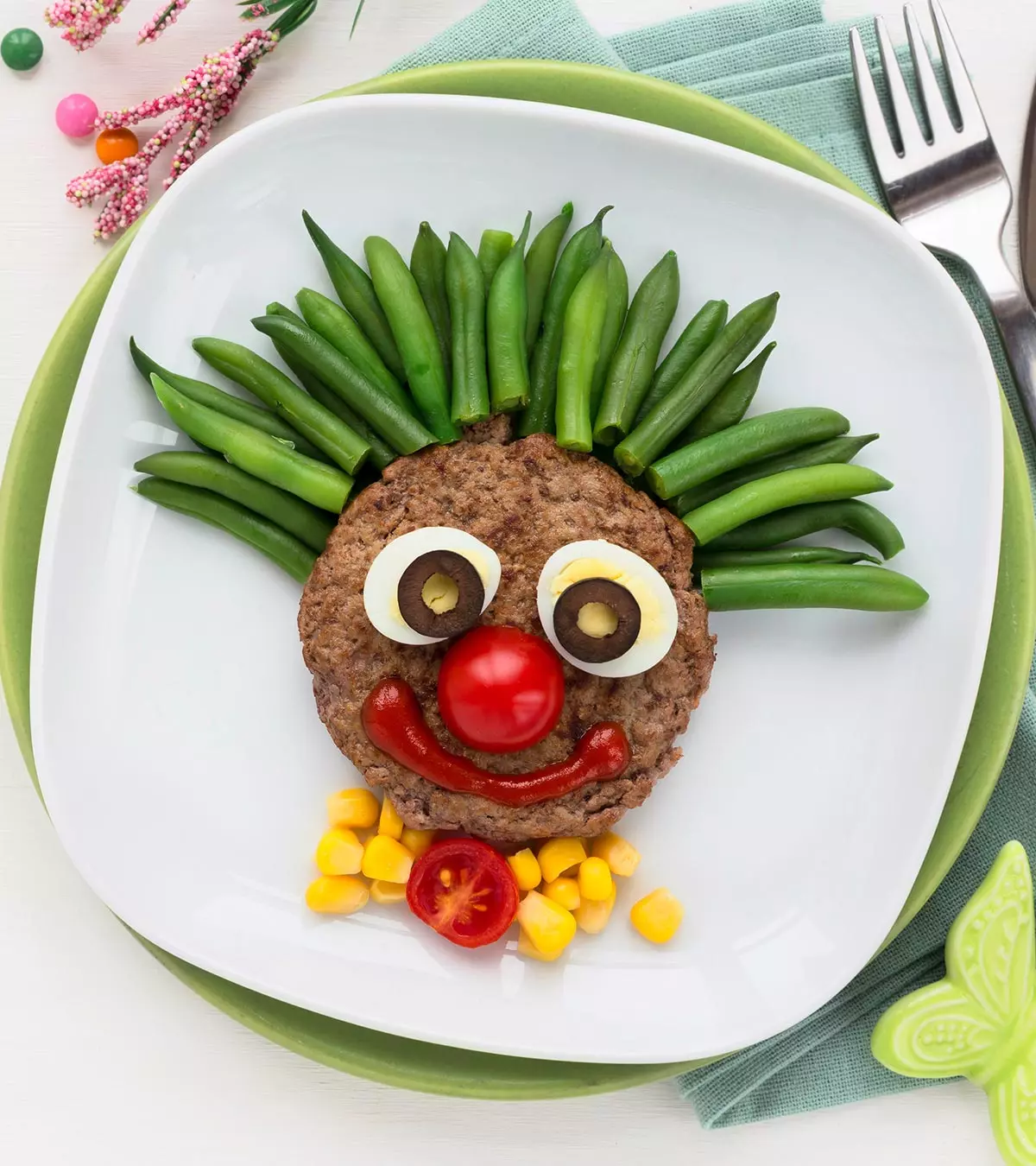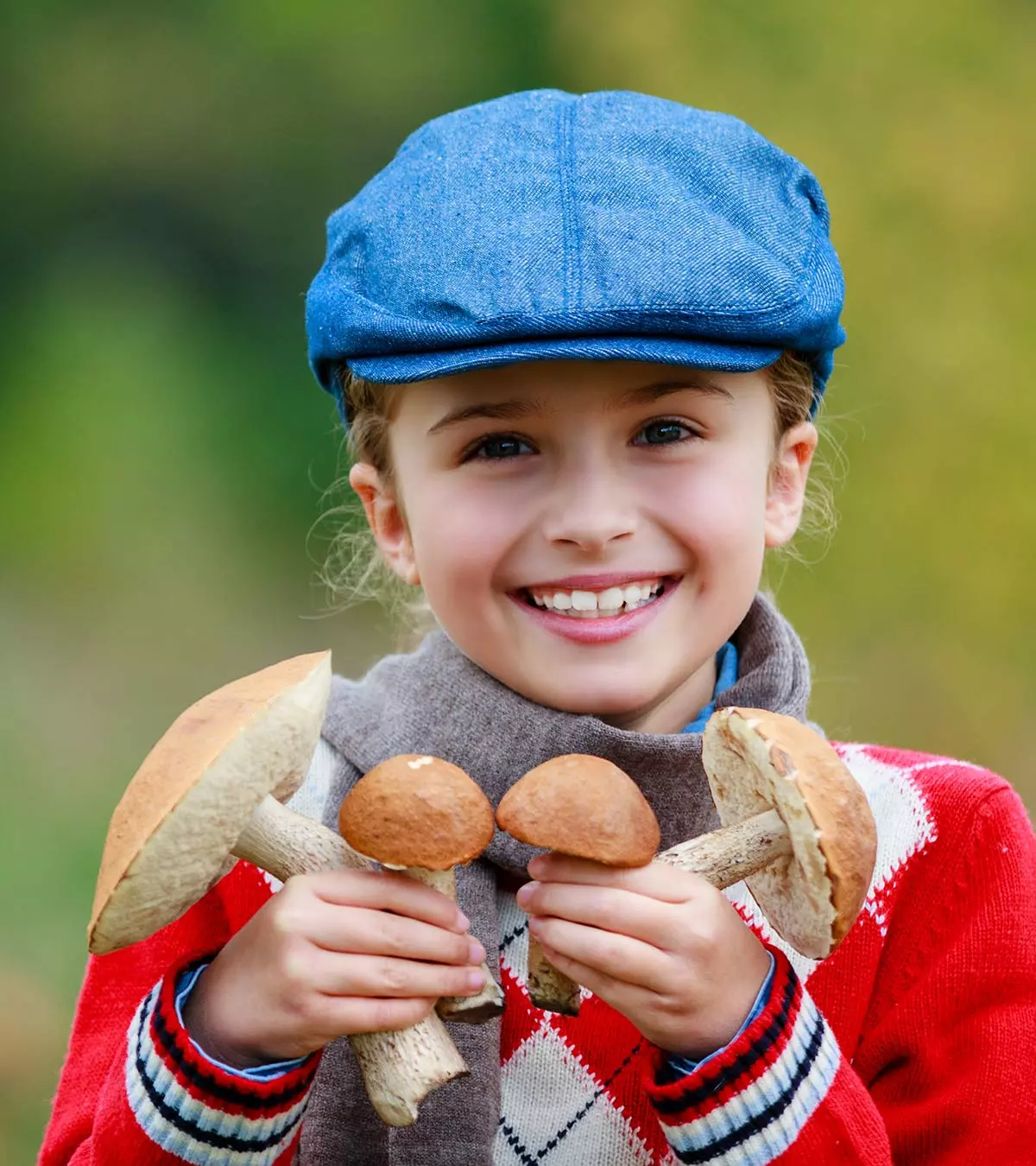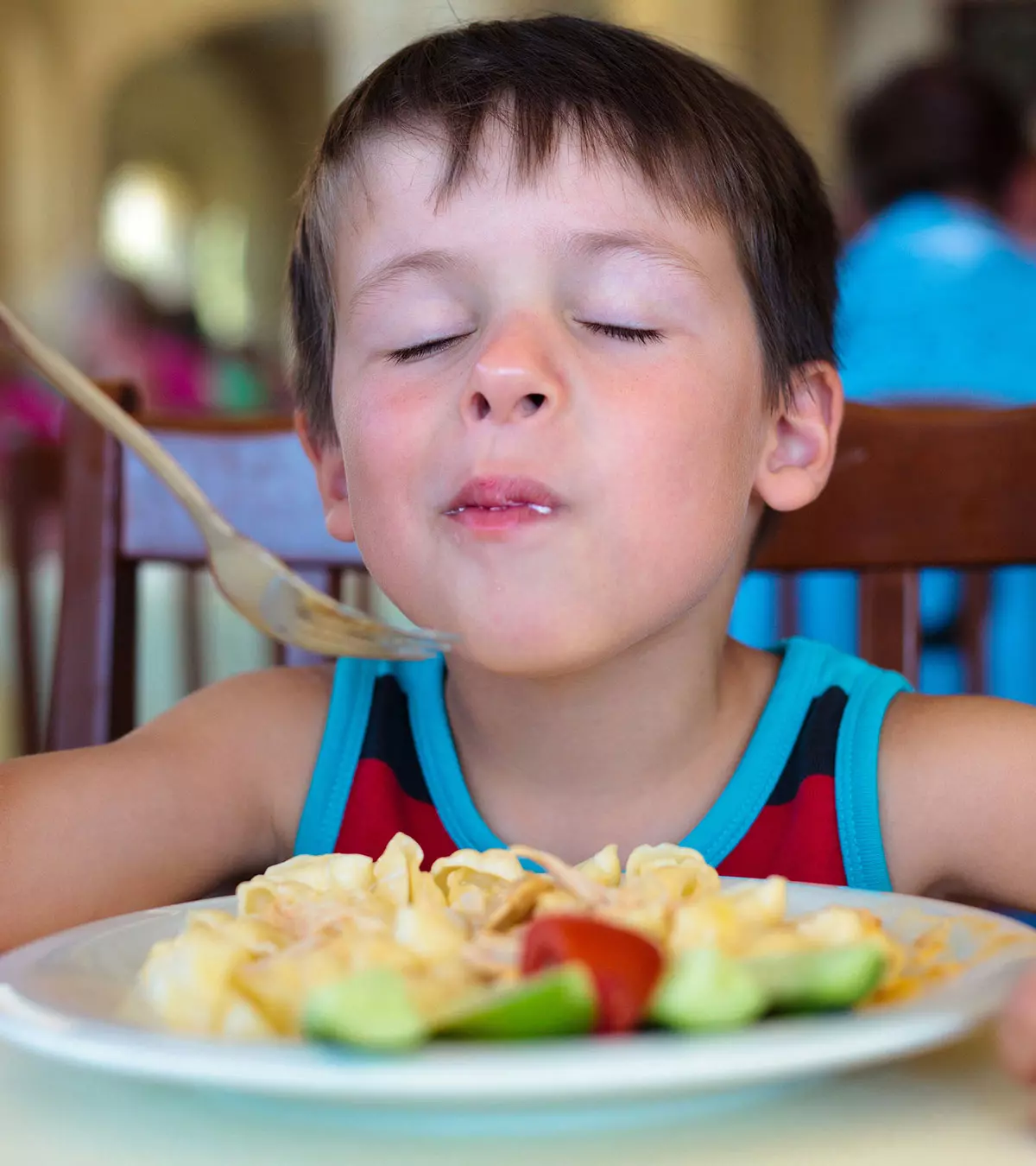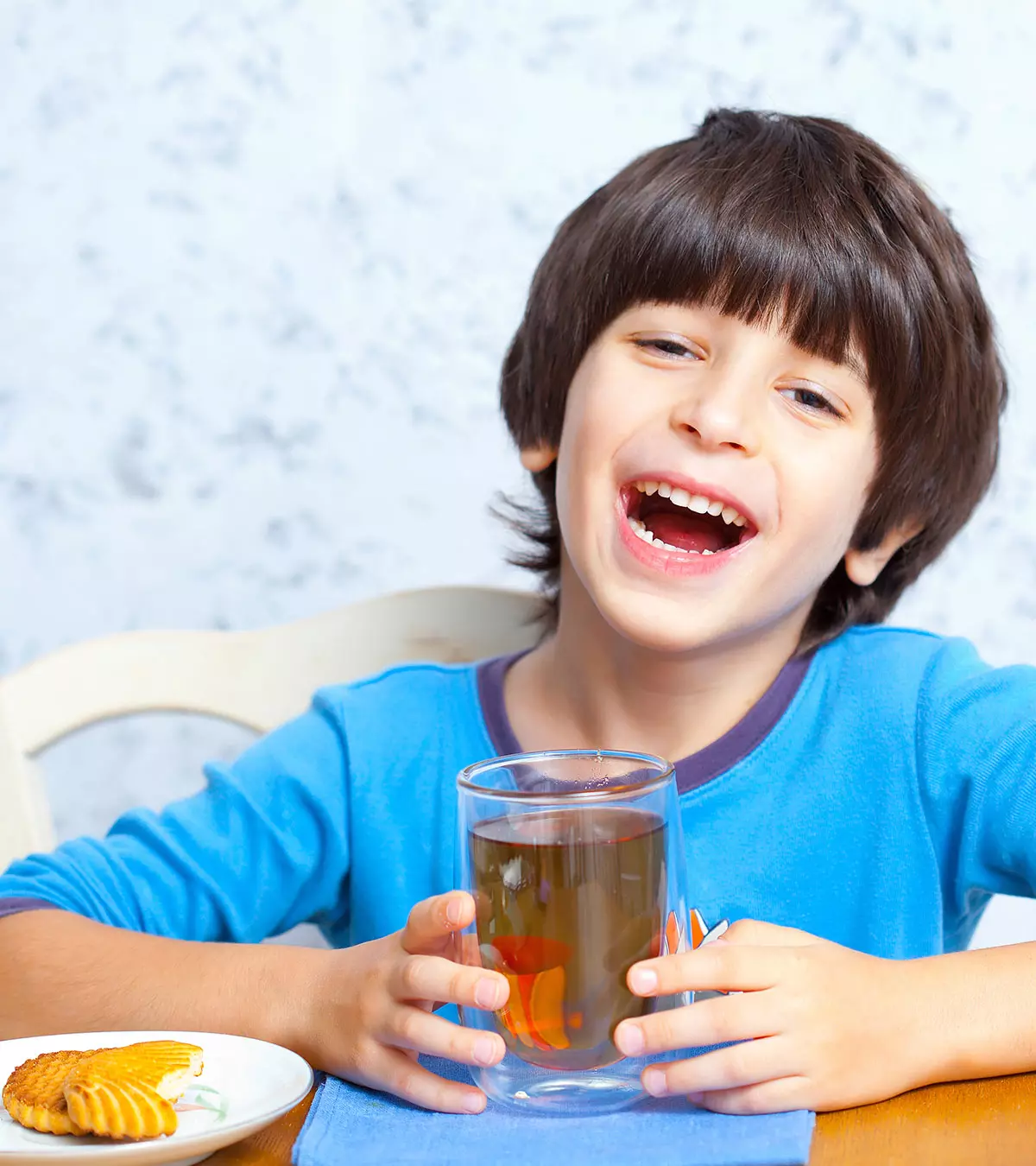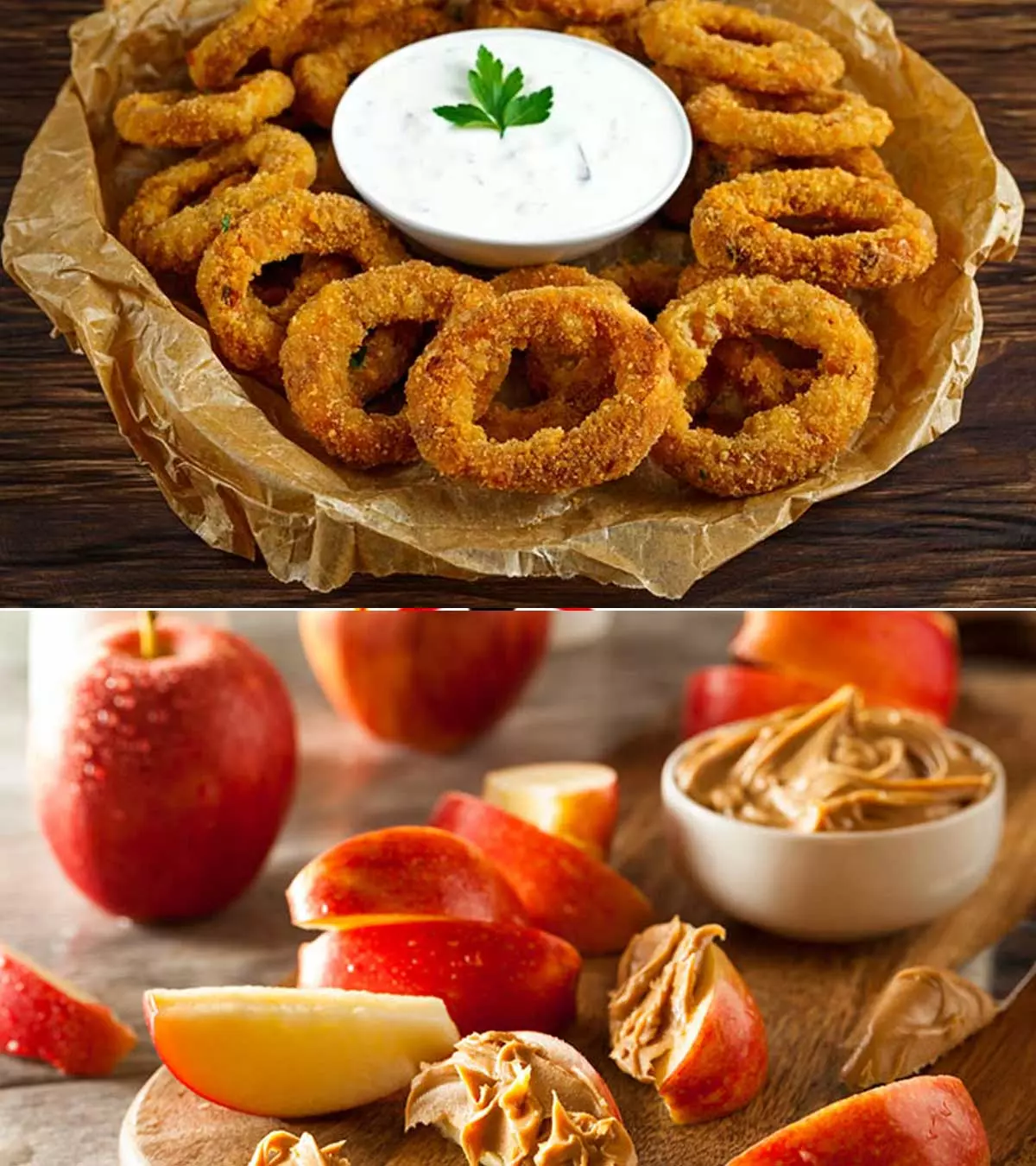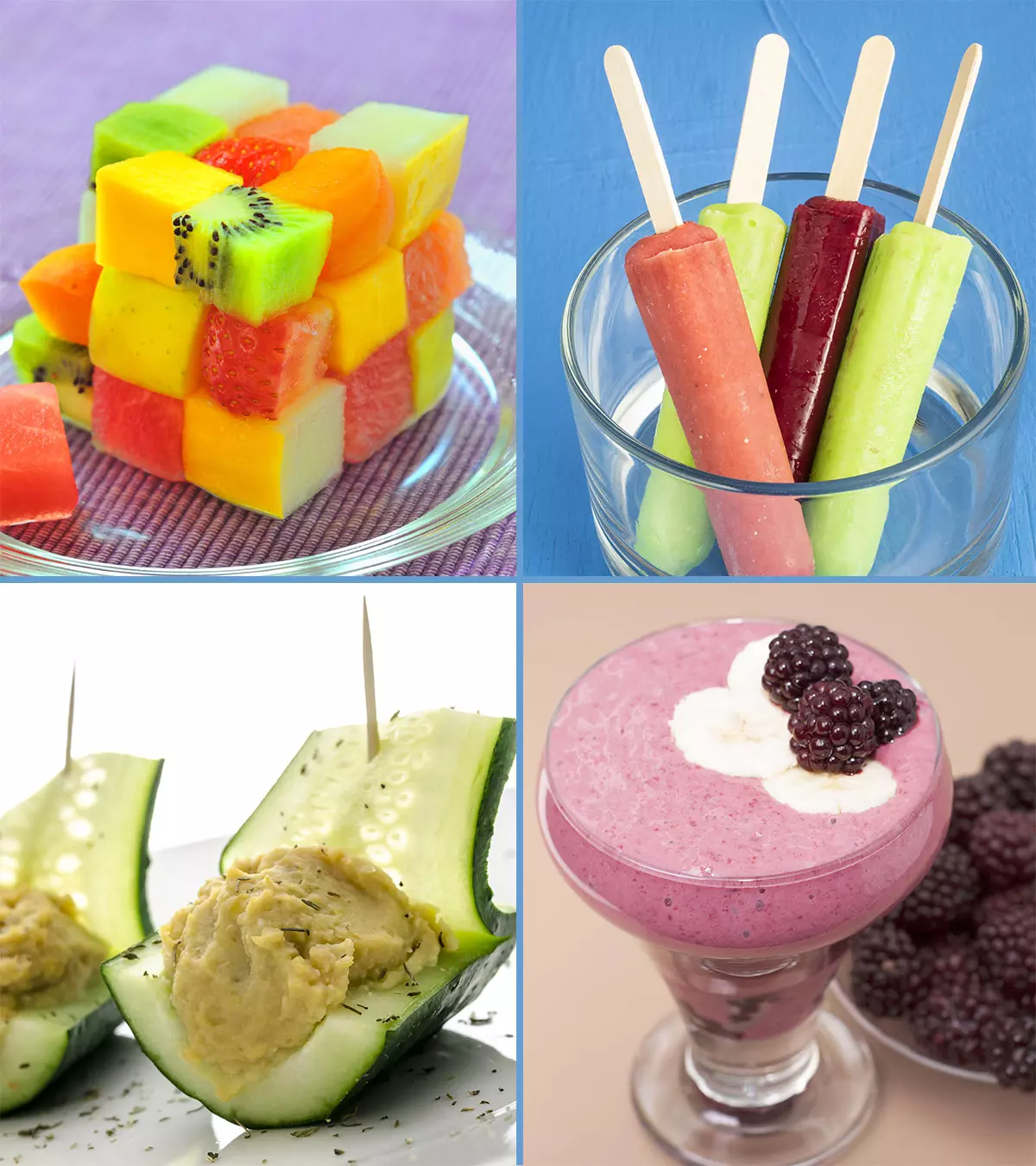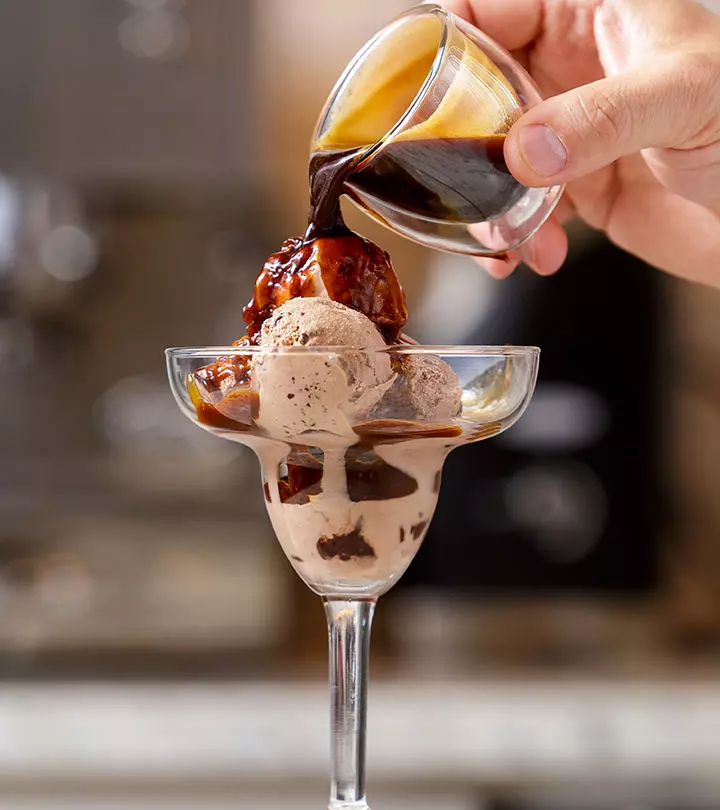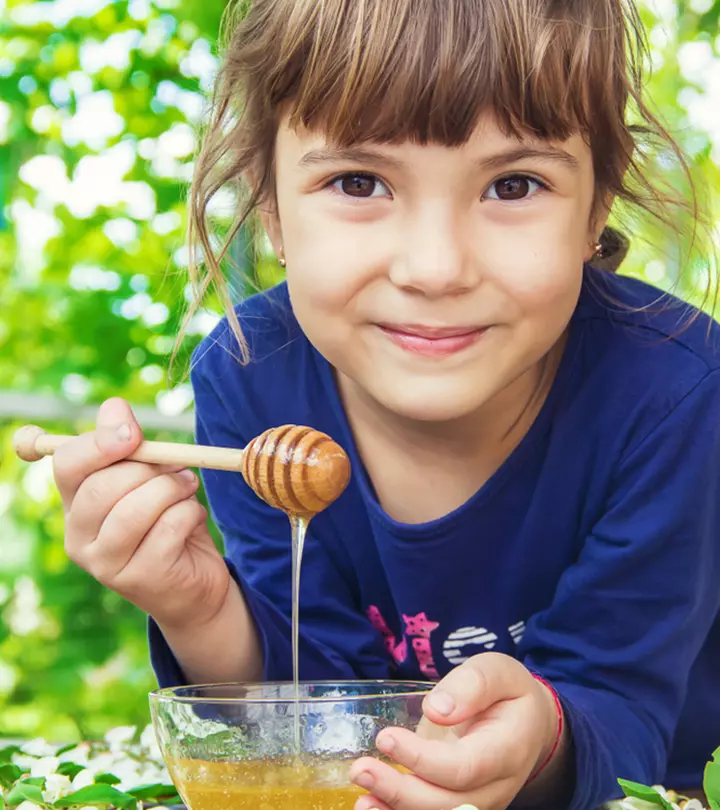
Image: Shutterstock
Honey for kids can be a healthy choice since it contains considerable amounts of phytochemicals and flavonoids that can impart several health benefits over time (1). The natural sweetener has moderate nutritional value and offers the same calories as refined sugar. However, honey may still be a better alternative to refined sugar since it also provides health-promoting compounds. You can use honey in food and home remedies to alleviate certain health issues and promote general health.

Read on as we tell you about the nutritional composition of honey, the right age to give honey to children, and the different ways you can give honey to children.
Key Pointers
- Children above one year of age can consume moderate amounts of honey as it is high in natural sugar.
- Honey is an energy-dense food with antiviral, anti-inflammatory, antibiotic properties that can promote overall health in the long run.
- Parents can use honey in common home remedies to treat ailments, such as cough and cold.
When Can You Give Honey To Children?
Honey is nutritious but should only be introduced to children after they are one year old. This is to avoid infant botulism, an illness that may occur due to the consumption of honey by children below the age of one year. The Centers for Disease Control and Prevention reported 162 cases of infant botulism, with females comprising 55% of the cases. Affected infants had a median age of four months, and it was found that three of them had used pacifiers containing honey.
Honey contains spore-forming bacteria called Clostridium botulinum, which can multiply in the intestine (2). The bacteria releases toxins that irritate the little one’s gut and affect the nervous system. It happens because the baby’s digestive system is underdeveloped and is not acidic enough to destroy Clostridium spores.
Honey is, however, safe for children above one year as their digestive system is mature enough to expel the bacteria through the body (3). However, use it as a replacement for refined sugar but not in addition to it.
Nutritional Value Of Honey
The nutritional value of 100g of honey is as given in the table (4).
| Nutrients | Amount |
|---|---|
| Energy | 304kcal |
| Carbohydrate | 82.4g |
| Glucose | 35.75g |
| Fructose | 40.94 |
| Potassium | 52mg |
10 Benefits Of Honey For Kids
Besides being a sweetener, honey offers some health benefits too.
- Energy-dense: A teaspoon of honey provides 20-30 calories and can be added to a child’s meal to meet their total calorie requirement. Also, its high carbohydrate content makes honey a great post-activity snack for a quick energy boost. If you give honey to your child, choose low GI honey like acacia, which will support their overall health (5).

- Supports healing: Honey is known for its healing properties. Its antimicrobial and wound-healing properties help treat lesions, insect bites, burns, boils, and sores. A mixture of honey with beeswax and olive oil might help in treating damaged skin and conditions such as atopic dermatitisiA chronic condition causing extremely dry, itchy rashes and inflamed skin or psoriasisiA condition marked by dry, itchy, scaly patches on the skin in children (6).
 Quick tip
Quick tip- Antiviral properties: Pure honey has antibacterial and antiviral properties against pathogenic bacteria and enteropathogensiMicrobes that cause intestinal diseases . These qualities are the likely reason for honey’s use in Ayurvedic medicine, especially for treating cough and cold. Controlled consumption of honey is known to have the potential to prevent tooth problems like tooth decay (5).
- Anti-inflammatory properties: Owing to its proven antioxidant activity, honey is considered a natural medicine for treating inflammatory conditions like sore throat, asthma, mucositisiInflammation of the mucous lining covering the mouth and the gastrointestinal tract , gastroenteritis, etc (7) (8).
- Antioxidant and antibiotic properties: Natural honey has antioxidant and antibiotic effects. Its radical scavenging property has been imparted to it by phenols whereas its antibiotic properties are imparted by inhibine. These health promoting properties of honey have made it one of the most widely food items for infants and children (9).
- Prebiotic properties: Honey works as a prebioticiFood sources that aid in the growth of healthy bacteria in the gut . It means it stimulates the growth of healthy bacteria in the gut. Honey added to buttermilk or yogurt makes a good pre-probiotic combination that helps maintain a healthy gut microbiome in kids (10).
- Relieves gastric reflux: If a child is suffering from GERD, then honey can be used for relief. The intake of honey rectifies this condition by coating the esophagus and stomach lining. This prevents the upward flow of food and gastric juice and thus provides relief. It further stimulates the tissues on the sphincteriA muscle capable of opening and closing the body passages to facilitate the normal flow of substances and thus assists in the regrowth thereby reducing the chances of acid reflux.

- Relieves constipation and diarrhea: Constipation and diarrhea are not uncommon in kids. So if they suffer from either, raw manuka honey can be taken on an empty stomach to get some relief. Honey helps improve bowel movements by increasing the water content of the stool.
- Promotes heart health: Honey has antioxidants like phenolic acids and flavonoids that might improve cholesterol levels, lowering the risk of heart disease. Though early studies suggest these benefits, more extensive, long-term research is needed to confirm honey’s positive impact on heart well-being (11).
- Enhances brain health: The polyphenols in honey reduce inflammation in the hippocampus, a brain region connected to memory. These polyphenols also shield against memory issues and aid in memory development on a small scale. Research suggests that honey’s influence on specific brain pathways leads to improved memory and brain health benefits. However, more studies are necessary for a comprehensive understanding (12).
Despite its several benefits, probably the most widespread medicinal use of honey is for the treatment of cough and cold.
Honey For Cough And Cold In Children

The American Academy of Pediatrics recommends against use of OTC drugs for cough and cold for children under four years of age, unless directed by a physician or pediatrician (13). Natural honey is known for its antimicrobial, antiviral, and antifungal properties, due to which people use honey as a natural remedy for cold and cough.
It is believed that pasteurized honey given before bedtime provides some relief from the symptoms of cough and cold in children aged over one year (14) (15).
Honey is also said to improve the quality of sleep in children.
A vlogger and mom who goes by the name ‘Mami Tai’ used a honey compress to alleviate her son’s cough. She shares the honey compress recipe: “Add two tablespoons of flour with one tablespoon of honey and mix it until you have a consistent paste. The paste should be such that you can grab and squish it with your hand. Apply this mixture to the tissue paper and tie the compress to the back using a muslin cloth. Apply it about two or three hours before bedtime, and don’t let the child sleep with it. I noticed that Leo (her son) started spitting up a lot of mucus, and he got better after four days of using this compress (i).”
 Quick tip
Quick tipWays To Give Honey To A Child
Introduce honey in a child’s diet gradually. Doing so will give you time to check for any probable allergic reactions. It will also give your child adequate time to adapt to honey’s delicious taste and sticky texture.
Here are a few ways you can replace refined sugar with honey:
- Add honey to oatmeal for enhancing the flavor of the dish.
- Instead of adding sugar, add honey to sweeten the milk.
- Spread it on bread toast.

- Mix yogurt and honey to make a delectable side dish.
- If your children like to have the smoothie sweet, you may add honey in it instead of sugar.
- Spread honey on pancakes and waffles.
- Use it as a topping, flavoring agent, or/or sugar substitute in baked foods.
Discontinue serving honey to the child, if you notice side effects such as breathing problems, muscle weakness, and constipation.
Precautions To Follow
Before consuming honey, it is necessary to ensure that its purity remains intact. Here is what you can do for that.
- Do not serve too much honey to children. Honey is high in calories and contains free sugars like fructose, which on over-consumption, might lead to undesired weight gain, dental caries, and gastric issues (16). So, practice moderation in use.
- Check the manufacturing date and contents mentioned on the label.
- Choose real honey, and read the labels to ensure that it isn’t adulterated with high-fructose corn syrup.
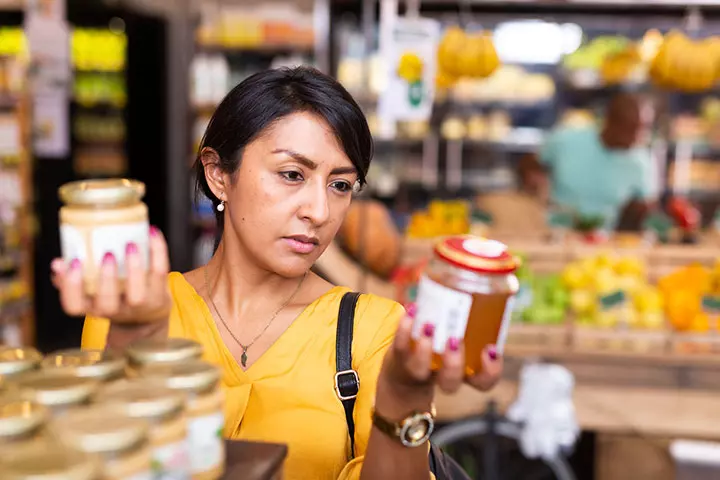
- Do not keep it in the open without a lid, as it may get contaminated by insects and dust.
- Store the honey bottle in a cool place.
Try and use the honey within a month or two of getting it, even though it stays fine and useful long after that.
Which Is Better: Raw Honey Or Processed Honey?
Raw honey contains nutrients in its original form but also has natural toxins such as grayanotoxinsiToxins naturally found in the honey derived from the plants of the genus Rhododendron , which can cause honey poisoning. The symptoms of honey poisoning include low blood pressure, nausea, and vomiting.
However, when the honey is processed, the toxins get diluted and may not have any severe effect on the body. Processed honey is also free of pollen grains and dust particles.
This suggests that processed honey has fewer risks compared to raw honey, but the nutritional value of raw honey makes it superior to the processed one (17).
 Did you know?
Did you know?Honey is a sweetener that is used as a sugar alternative. Unlike plain sugar, honey contains trace amounts of vitamins, minerals and has some health benefits. However, unprocessed honey may contain harmful bacteria and allergens. Feed only safe and sterilized honey for kids as it may not contain any toxins. Always check the ingredients list before purchase and avoid products that contain artificial colors and flavors. Also, introduce honey to them gradually. Consult a pediatrician if they develop any symptoms of intolerance after their first consumption. Once your child gets comfortable with the taste and the flavor, you may use this as an alternative sweetener in desserts or other recipes.
Frequently Asked Questions
1. How much honey can my child have in a day?
According to AAP, children aged two years and above should consume no more than 25 grams (6 teaspoons) of added sugar per day (18). Since children eat several things, such as pre-packaged foods containing added sugar, keep a strict check on how much sugar your child consumes and adjust the quantity you add to their food accordingly.
2. Can honey cure flu in children?
Honey can’t cure or treat the flu. However, it could relieve bothersome flu symptoms such as cough and sore throat. Experts recommend using honey as cough relief. However, they remind parents not to use honey for babies under 12 months of age (19).
3. Which type of honey is best for children ?
Some clinical studies have found that manuka honey and buckwheat honey are helpful for children. These types of honey are likely to treat constipation, chronic bronchitis, sleep problems, respiratory problems, and nocturnal coughs (20) (21).
4. How much honey can we give to children?
Children above one year can consume up to one teaspoon of honey as a cough relief medication (22). However, it is best to consult a doctor on the optimum daily quantity for regular consumption.
5. How can honey help improve a child’s immune system?
Honey has antimicrobial properties and is rich in essential nutrients, antioxidants, and amino acids that aid in resolving several health issues. Thus, honey is known for its immune-boosting qualities (23).
Infographic: Honey Types And Quality Determination
When consumed in moderation, children can reap several potential health benefits of honey. Our infographic shares different types of honey that children above 12 months can relish. Additionally, we provide a few simple tests to distinguish real honey from artificial honey. Illustration: Momjunction Design Team
Illustration: Honey For Kids: When To Introduce Benefits And Precautions
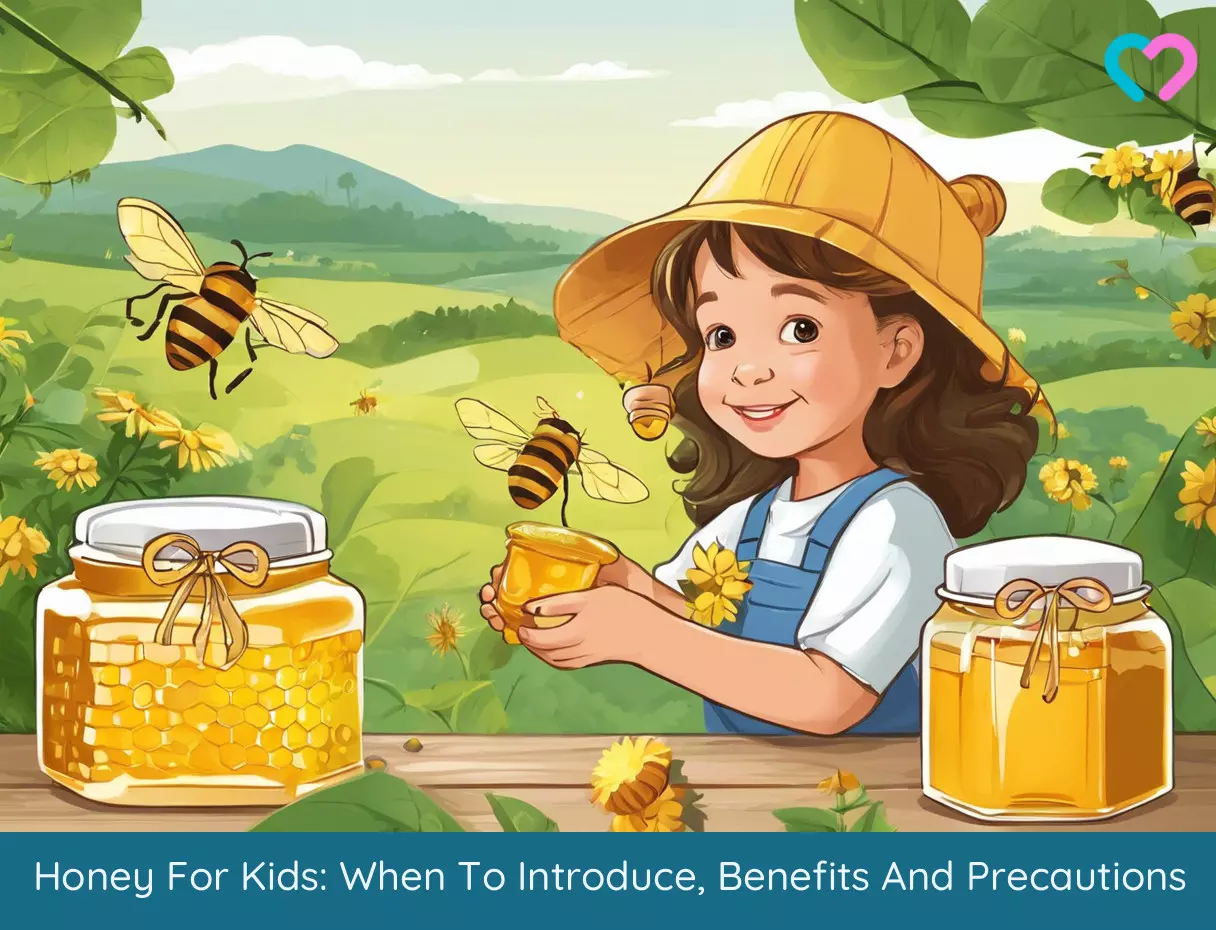
Image: Stable Diffusion/MomJunction Design Team
Uncover the manifold benefits of Manuka Honey, a natural wonder, in the video given below. Check it out to know about its various effects on oral health and overall well-being.
Personal Experience: Source
MomJunction articles include first-hand experiences to provide you with better insights through real-life narratives. Here are the sources of personal accounts referenced in this article.
i. Natural cough remedy for kids (and adults) – Mami & Papi;https://www.youtube.com/watch?si=xxfuh_KMmQp4Rw7U&v=5kS4X4zYmzA&feature=youtu.be
References
1. Visweswara Rao Pasupuleti et al., Honey, Propolis, and Royal Jelly: A Comprehensive Review of Their Biological Actions and Health Benefits;National Centre for Biotechnology Information (2017)
2. Botulism; Health Issues; Healthy Children; American Academy of Pediatrics (2018)
3. Can I Feed My Baby Honey?; Kids Health From Nemours (2018)
4. Honey; Food Data Central; USDA
5. Sultan Ayoub Meo et al., Role of honey in modern medicine; National Centre for Biotechnology Information (2016)
6. Noori S.Al-Waili, Topical application of natural honey, beeswax and olive oil mixture for atopic dermatitis or psoriasis: partially controlled, single-blinded study; Researchgate (2004)
7. MG Miguel et al., Honey as a Complementary Medicine; National Biotechnology Information (2017)
8. Soad K. Al Jaouni et al., Effects of Honey on Oral Mucositis among Pediatric Cancer Patients Undergoing Chemo/Radiotherapy Treatment at King Abdulaziz University Hospital in Jeddah, Kingdom of Saudi Arabia; National Centre for Biotechnology Information (2017)
9. Abdulwahid Ajibola et al., Nutraceutical values of natural honey and its contribution to human health and wealth; National Centre for Biotechnology Information (2012)
10. Tahereh Eteraf-Oskouei and Moslem Najafi, Traditional and Modern Uses of Natural Honey in Human Diseases: A Review; National Centre for Biotechnology Information (2013)
11. Is honey healthy? How to make sure you don’t get stung; American Heart Association
12. Saeed Samarghandian, Tahereh Farkhondeh and Fariborz Samini (2017); Honey and Health: A Review of Recent Clinical Research; PMC
13. Can I give my 5-year-old over-the-counter cough medicine?; American Academy of Pediatrics
14. Ran D. Goldman; Can Fam Physician (2014); Honey for treatment of cough in children
15. Ran D Goldman and Canadian Paediatric Society, Drug Therapy and Hazardous Substances Committee; Treating cough and cold: Guidance for caregivers of children and youth; National Centre for Biotechnology Information (2011)
16. Dental: Cavities in Baby Teeth; Nationwide Children’s Hospital
17. The Risks of Eating Raw Honey; Food Safety Topics; Centre for Food Safety; The Government of the Hong Kong Special Administrative Region
18. Added sugar in kids’ diets: How much is too much?; AAP
19. Symptom Relief for Viral Illnesses; CDC
20. Marra et al.; The Toxic Impact of Honey Adulteration: A Review; NCBI
21. Paul et al; Effect of honey, dextromethorphan, and no treatment on nocturnal cough and sleep quality for coughing children and their parents; NCBI (2025)
22. Help for a Child with a Cold; University of Rochester Medical Center
23. Does Honey Work Better than Cough Medicine?; Penn State University
24. Treating Canker Sores with Honey; nutritionfacts.org
25. Rafieh Fakhlaei et al.; The Toxic Impact of Honey Adulteration: A Review; NCBI (2025)
Community Experiences
Join the conversation and become a part of our nurturing community! Share your stories, experiences, and insights to connect with fellow parents.
Read full bio of Eva De Angelis
Read full bio of Swati Patwal
Read full bio of Rohit Garoo
Read full bio of Dr. Joyani Das






